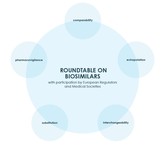Biosimilars/Research
Comparability of biosimilar Ontruzant maintained over three years
Samsung Bioepis has presented positive long-term results for its trastuzumab biosimilar Ontruzant (SB3) at the 16th International Maternal Cancer Congress St Gallen 2019, which was held in Vienna, Austria.
Clinical development of a bevacizumab biosimilar
Authors, Kambiz Novin and Nafiseh Mortazavi, from medical faculties of Iranian Universities, discuss the methodological considerations for the clinical development of a bevacizumab biosimilar [1].
Economic considerations for biosimilars in the US
Smeeding and colleagues explore cost considerations related to biosimilars in the US, and present a broad perspective on value beyond price reduction in a recent review.
Biosimilar drug packaging does not meet EU guidelines on readability
Analysis of 35 biosimilar medicines licensed by the European Medicines Agency (EMA) finds packaging to be more complex than recommended. None of the packaging leaflets analysed were found to be ‘easy to understand’, with sections on therapeutic indication and side effects found to be the most complex [1].
Efficacy and safety of bevacizumab biosimilar ABP 215
Authors from the US and Europe report data from a phase III study comparing the clinical efficacy and safety of the bevacizumab biosimilar ABP 215 (Mvasi) with originator bevacizumab Avastin in patients with advanced non-squamous non-small cell lung cancer (NSCLC) [1].
Key considerations for biosimilars in the US
Key considerations regarding biosimilars for payers in the US are discussed in a recent review [1]. The authors explore factors promoting the uptake of biosimilars, interchangeability and naming considerations, and challenges to uptake.
Impact of proposed changes to FDA approach to biosimilars
In the Opinion article, Professor Sarfarez Niazi urges the US Food and Drug Administration (FDA) to make adjustments to its guidance on biosimilar development [1]. Niazi’s proposals are consistent with the anti-regulatory political rhetoric and administrative actions that are becoming increasingly widespread in the US. In this article, Professor Pekka Kurki comments on some of Niazi’s proposals from a global perspective [2].
ESMO survey highlights need for education and alignment
The results of a survey carried out by the European Society for Medical Oncology (ESMO) on biosimilars understanding in oncologists have highlighted the need for education and worldwide alignment [1].
Phase III clinical trials started for adalimumab biosimilars
Phase III clinical trials have been started for adalimumab biosimilars from Alvotech and Celltrion.
How can EU policymakers access the potential of biosimilars
Policymakers in Europe should introduce a long-term, multi-stakeholder framework to realize the full potential of off-patent biologicals and biosimilar drugs, according to the results of a series of roundtable discussions held with clinicians, government bodies and industry representatives [1].
Comparison of autoinjectors for inflammatory joint or bowel disease
Imraldi is a biosimilar of the antitumour necrosis factor (TNF) monoclonal antibody adalimumab. It was approved in Europe in August 2017 for the treatment of various inflammatory conditions [1].
Clinician biosimilar prescribing habits and need for education
At present, biosimilar prescribing and clinical use remain contingent on individual healthcare provider preferences. Although novel legislation and policy continue to promote biosimilar drug development, clinician hesitancies curtail biosimilar use in practice, thereby limiting overall market uptake. Findings from a recently published systematic review indicate that clinicians in Europe and the US do not primarily support the use of biosimilars as safe and effective therapies in patients already receiving originator biological treatment [1].
Comparison of Brazilian regulations for follow-on biologicals with EMA, FDA and WHO
Authors Marcos Renato de Assis and Valdair Pinto outline the strengths and weaknesses of the Brazilian regulation on follow-on biologicals and compare regulations in Europe, the US and the world [1].
Trastuzumab biosimilar PF 05280014 non-inferior to Herceptin
Results of a study of Pfizer’s trastuzumab biosimilar (PF 05280014) have shown that the biosimilar is non-inferior to the originator biological, Roche’s Herceptin (trastuzumab) [1].
Positive phase I results for Mycenax’s tocilizumab biosimilar
Taiwanese biosimilars developer Mycenax announced on 31 December 2018 that results from the phase I study of its tocilizumab biosimilar, LusiNEX, had met its primary endpoints.
Mandatory and non-mandatory switching for biosimilars
Glintborg and co-authors responded to the comments made by Marc Scherlinger and Thierry Schaeverbeke on their paper ‘To switch or not to switch’, which reported the results of biosimilar etanercept switching in Denmark [1].
Positive phase III results for rituximab biosimilar CT-P10
Celltrion has presented positive phase III results for its rituximab biosimilar CT‑P10 at the American Society of Hematology Meeting (ASH) annual meeting.
Biosimilar teriparatide approved for the treatment of osteoporosis
Osteoporosis is a modern day epidemic longevity has brought about and represents an enormous socioeconomic burden. Being largely asymptomatic the silent thief can get away with insidiously stealing the patient’s bones until, as a result of the relentless bone loss, fragility fractures inevitably occur. The first, so-called sentinel fracture is the forerunner of the devastating fracture cascade as any prior fracture translates into a two- to four-fold increase in the risk of sustaining a subsequent one within one year [1].
Positive phase III results for rituximab biosimilar ABP 798
Biotech giant Amgen, and its partner Allergan, announced on 24 January 2019 positive data from a phase I/III study of its rituximab biosimilar (ABP 798) compared to Rituxan (rituximab).
Questions over DANBIO relevance for non-medical switching
Italian rheumatologists Fabrizio Cantini and Maurizio Benucci commented on the paper from Glintborg and co-authors ‘To switch or not to switch’, which reported the results of biosimilar etanercept switching in Denmark [1].























